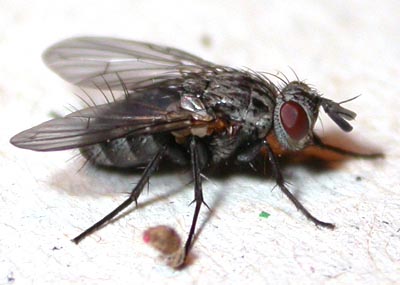Thread subject: Diptera.info :: [Triarthria setipennis] From pupa to imago
#1
Hello,
Here are some pupas I found under bark form a plane tree :
 (St Apollinaire (21), France - March 2004 - pupas 4 mm long)
(St Apollinaire (21), France - March 2004 - pupas 4 mm long)
They were fixed to the nest of some
Gnophosidae Arachnid (
Haplodrassus sp ?), nearby a dead
Forficula sp.

Imagos emerged in April :
 - Can anyone help identifying ?
- Can anyone help identifying ?
- And what is the relation between these pupas, the Forficula corpse and the arachnid nest ?...
Thanks !
#2
Hoi Benoit,
The first thing I can tell you is that the flies belong to the family Tachinidae!
Members of this family are known parasites from all kinds of families of insects, like for example Lepidoptera and Hemiptera.
Maybe it is a parasite on the earwig, but that is hard to tell!
It can be a coincidence that you have found it in this position.
Greetings!
#3
If it is one of the Dermaptera parasitoids, then the pupa at least fit that of
Triarthria setipennis. I have no good illustration of the adult, but at least in the old plate by Meigen, the thorax in that species in entirely grey. That could be difference of sexes, lighting, etc. Maybe someone can confirm the adult id?
#4
Thanks.
I'm not sure at all whether these flies were parasitoids of the dermaptera, or whether the dermaptera was just some prey of the arachnid that was in the nest (because there was one in the white nest one can see on the second photo).
The pupas were like "incrustated" in the arachnid nest silk.
For the color of the thorax, I can confirm there are some dark markings (dried specimen still available).
Posted by
Zeegers on 07-09-2004 17:14
#5
Paul is right:
It is Triarthria setipennis, a parasitoid of Dermaptera.
This species is quite common and can be reared rather easily,
as well demonstrated !
Theo Zeegers


